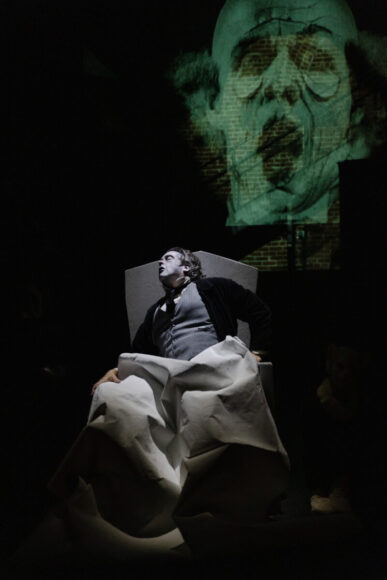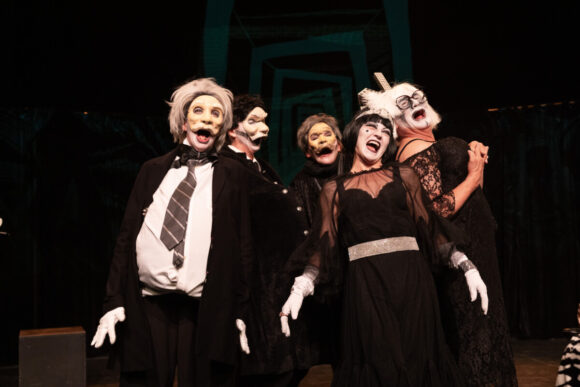Tim Robbins’ theater, The Actors’ Gang, is located in the Culver City district of Los Angeles and can be considered a cornerstone of European theater in the community – a permanent home for The Actors’ Gang company. Under the artistic direction of the world-famous actor, the Los Angeles-based company, which is considered ancient by local standards, celebrated its 40th anniversary last year and appropriately opened its 41st season with the play “Methusalem” on October 21.
This play by Ivan Goll, a German-French author, counts as a revival in the four-decade history of the company. The 1985 original cast included names like Helen Hunt, Ron Campbell, Lee Arenberg, Ebbie Roe Smith, Robert Gourp, and V.J. Foster – who, as freshly graduated artists from UCLA, formed The Actors’ Gang with youthful enthusiasm under Tim Robbins’ direction. The current company has naturally changed, and refreshed with young, talented actors, but many of the founding members still take the stage at The Actors’ Gang.
According to archive photos in the program, the visual representation of “Methusalem OR The Eternal Bourgeois” (Methuselah or the eternal citizen) has not changed much. In the austere black-and-white set, actors in black-and-white costumes with white-masked faces mimic human behaviors, creating grotesque figures in this surreal play. This visual world and atmosphere strongly tie to the author’s creative environment. Living and creating in the avant-garde era, Goll’s work was most influenced by Expressionism and Surrealism, elements of both styles are evident in the loosely coherent yet cohesive, symbol-laden presentation of “Methusalem.”
The opening scene of the performance features typical American – yet with Hungarian references and names (!) – speaking fortune-telling machines, the so-called “Zoltans,” equipped with human torsos, rolling around the sparsely arranged stage. This bizarre contraption becomes a grotesque laughing machine, a Joke Box, a pathetic symbol of the bourgeoisie on the verge of collapse in the 1930s. This element of the Haha-machine strongly threads through the entire play, holding together its texture. It highlights the alienated world where humans are no longer human, where the upper classes have turned into repulsive figures, grotesque caricatures of themselves, and the world around them operates like the black dust-covered, dirty, coughing, clanking steam engines of the factories during the industrial revolution.
The director creates his characters accordingly in this grotesque, alien world – we do not see people, but puppets on stage, their mere presence becoming a symbol of a social group.
First, we meet the title character, Methuselem (Scott Harris). In the center of the stage, there’s a strange, throne-like chair, as if designed by Picasso during his Cubist period. Into this darkly lit space, with broad gestures and loud pronouncements, arrives Methusalem, the shoe manufacturer. He is only outdone in loudness by his wife, Amelia (Kaili Hollister), who is already on stage when Methusalem falls asleep in the big chair and sees bizarre fever dreams. This moment of falling into dreams also becomes a recurring element – a symbol itself, the dreams of bourgeois world domination turning into nightmares and reaching Methuselah’s shoe factory with the Bolshevik revolution. For the staging of the dreams, the director resorts to the obvious scenic tool of projector projections. The dreams themselves appear in black and white.
The projection on a tulle stretched in front of the rear set wall creates a three-dimensional effect, and we feel as if we are part of Methuselah’s dream. The director later uses projection in a much more creative way – Felix, the son who has robot attributes, constantly interacts with a projected elevator, which also becomes one of the hotbeds of the play’s frivolous humor, as characters miss or rush their entrance and exit from the elevator. Pierre Adeli brilliantly portrays the son, who can’t assess his own intellectual abilities and strives to assert himself with irritating gestures as his father’s favorite – or as a brilliant robot boy. The relationship between Methusalem and Felix reflects why the bourgeoisie is ripe for destruction. The father, disregarding his daughter Ida (Ana Ming Bostwick-Singer), feels his only parental duty is to marry her off suitably (to someone wealthy). But here’s the twist, the girl has feelings. She falls in love with a rebellious Bolshevik medical student from Baku living in the house, much to the despair of her parents. One of Amelia’s peak scenes is linked to this, as she rolls across the stage in her hoop-skirted dress, having a hysterical fit. Kaili Hollister’s performance is exceptionally entertaining, simultaneously a dramatically false diva and a cheap, buffoonish wife, imagining herself as a lady.
However, before the societal conflict slowly unfolding around the Methusalem family is fully revealed, a truly surreal scene gives us a glimpse of what’s happening outside the walls. It’s night, Methusalem is sleeping in his chair, and the animals in the room come to life. The spread-out bear, the deer killed for its antlers, the cuckoo clock, the cymbal-playing monkey, even the house cat and dog join the discourse. The bear, portrayed by Hungarian actress Dora Kiss has a commanding voice, and the honey-sweet, love-seeking cat played by Jolene Hjerleid offers a great contrast. The animal scene is like a play within a play, standing on its own as an independent performance.
Under the direction of Brent Hinkley, the actor-director beautifully utilizes the possibilities of physical theater. He creates a different form of expression for almost every character. Methuselah’s entire scene is built on pantomime, Ida almost flies across the stage with joy, the animals adopt movements suitable for their characters, and Amelia herself is a drawn caricature, made complete by wide gestures spreading in all directions and grotesque grimaces on her face.
After the animal scene, the pace of the play and the events accelerate. Ida, falling in love, is the true avant-garde female ideal. The actress’s slender, flexible figure, like a Klimt girl, her gestures light and airy, is a breath of fresh air to watch after Methusalem, Felix, and Amelia’s uncomfortable aura. Ana Ming Bostwick-Singer is well matched with Fernando Siqueira, who plays the student from Baku. He brings to life the character of the young prophet-like revolutionary, who has also conquered half the town with his irresistible charm. Their unwanted love not only brings down the bourgeoisie but also the Methusalem family, and eventually destroys everything. Even the illusion of love. In the end, nothing remains but the blood-soaked laughter of the Joke Box and the aftertaste that, alongside Surrealism and Expressionism, Dada also claimed its place in Methusalem.
– Virág Vida –



















